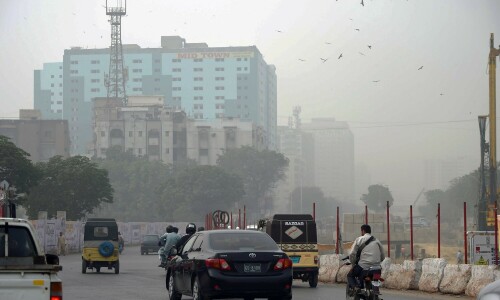KARACHI: Alarmed at the growing environmental burden of disease and a lack of focus on the subject, experts at a seminar on Tuesday observed that the people of Karachi were particularly at a significant risk due to increased consumption of fuel and high levels of air pollution in the absence of a mass transit system.
Speaking at the seminar titled Environmental Risks and Effects on Human Health, they suggested that the city needed various interventions including a heat management plan.
The event was organised by the APPNA Institute of Public Health (AIPH) at Jinnah Sindh Medical University (JSMU).
Highlighting the impact of environmental factors on public health, experts linked air pollution exposure to several illnesses, including cardiopulmonary diseases, cancer, diabetes, tuberculosis, neurodegenerative disorders, mental health issues, pregnancy losses, reduced birth weight and decreased life expectancy.
Experts call for devising heat management system for Karachi
“The World Health Organisation says that approximately seven million people died in 2012, accounting for one in eight global deaths, as a result of exposure to air pollution. This data confirms that air pollution is currently the biggest single environmental health risk worldwide,” Prof Amna Rehana Siddiqui of AIPH shared in her welcome speech.
Environmental factors, such as poor sanitation and water supplies as well as extreme weather events, pose a significant threat to individuals, either directly through exposure to harmful agents or indirectly by disrupting vital ecosystems required for sustaining life, she added.
Prof Haider A. Khwaja, who is associated with the Department of Environment Sciences at the University of Albany’s School of Public Health, pointed out that today environmental factors accounted for 24 per cent of the global disease burden and 23pc of all deaths, with the burden of environmental diseases being 15 times higher in developing countries.
Call for heat management system for Karachi
During the seminar, the devastating consequences of severe heatwaves that hit Karachi in June 2015 and 2020 were discussed. The events resulted in numerous deaths and a high number of heat-related illnesses.
“Karachi’s vulnerability to extreme heat is high. Hence, we need to have a heat management system specially designed for the city,” JSMU Vice Chancellor Prof Amjad Siraj Memon said.
The experts also spoke about the weather forecast indicating a significant decrease in rainfall in Pakistan, with the possibility of minimal to no rain by 2025.
By the year 2027, temperatures in Pakistan were expected to reach as high as 50 degrees Celsius, they said.
Prof Zafar Fatmi, Dr Aamir Alamgir and Prof Nausheen H. Anwar also spoke.
Later, JSMU Pro VC Prof Dr Saadia Akram and registrar Dr Azam Khan distributed shields and ajrak among the speakers.
Published in Dawn, October 25th, 2023















































Dear visitor, the comments section is undergoing an overhaul and will return soon.